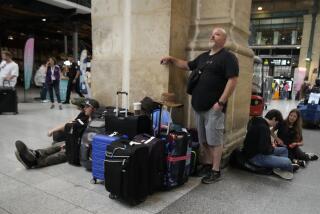Russia says homemade bomb caused deadly train derailment
- Share via
Reporting from Atlanta and Moscow — Russian officials are blaming terrorists for the derailment of a Moscow-to-St. Petersburg passenger train that killed at least 26 people and injured dozens more.
Authorities said Saturday that a homemade bomb equivalent to about 15 pounds of TNT detonated when the Nevsky Express, carrying more than 650 passengers, passed over it about 9:30 p.m. Friday. Traces of the device were found at the scene, officials said.
“Indeed, this was a terrorist attack,” said Vladimir Markin, a spokesman for the investigative committee of the Russian prosecutor-general’s office, Interfax news agency reported.
President Dmitry Medvedev called an urgent meeting of top officials at the Kremlin to deal with the situation.
“Based on preliminary data, criminal experts say that it was an explosion of a self-made 7-kilo TNT equivalent explosive device,” Federal Security Service chief Alexander Bortnikov said in televised remarks. An investigation has been launched, he said.
As of late Saturday, officials were preparing sketches of possible suspects, but did not know who was responsible for the attack.
Many of the victims were in serious condition, Russian Health Minister Tatyana Golikova said in televised remarks. The dead were taken to a morgue in the city of Tver, where the identification process will begin today, according to media reports.
Emergency relief workers moved seriously injured victims to the nearest towns of Bologoye and Tver and from there to Moscow and St. Petersburg.
The derailment occurred not far from the village of Uglovka in the Novgorod region, about 250 miles northwest of Moscow. At the time of the explosion the train, which was full, was traveling about 125 mph, railway officials said.
The Nevsky Express between Moscow and St. Petersburg is the fastest railway line in Russia, covering about 440 miles in 4 1/2 hours. The explosion caused at least two cars to go off the tracks and damaged several others, said passengers who described feeling something like a loud metallic bump, as if the train had hit something or lost a wheel just before the derailment.
“The train shook and pieces of luggage started falling down from the upper shelves on our heads,” Boris Gruzd, a 44-year-old lawyer who was on the train, said in a telephone interview. “I realized the train was skidding to brake and I immediately smelled something burning.”
The wreckage was devastating, according to several people who said they were on the train.
“It was as if you were in a battlefield,” said Ilya Gureyev, 42, a financier who lives in St. Petersburg and works in Moscow, also in a phone interview. “As if you were in war.”
Gureyev and Gruzd were among passengers and crew members whose cars did not derail, and who took part in the rescue effort. The first car they reached was lying on its side not far from the rails. They said they carefully stepped over the debris in search of survivors.
“That was a really horrible sight,” Gruzd said. “This eerie silence was hanging in the air. It was dark, damp and still.”
Late Saturday afternoon, as the cleanup and restoration work was in progress, a smaller explosion occurred nearby, said Russian Railways head Vladimir Yakunin. No injuries were reported, he said.
Dozens of trains were delayed across northwestern Russia and thousands of passengers were stranded at railway stations.
Medvedev called for people to stay calm. “We need there to be no chaos, because the situation is tense as it is,” he said, according to news reports.
The Russian government spent much of the 1990s and early 2000s locked in a bloody struggle with Islamist separatists in the southern republic of Chechnya. Those years were punctuated by dramatic attacks by militants deep in the Russian heartland, including blood-drenched attacks on a Moscow theater, and infamously, a 2004 assault on a grammar school in Beslan, in the North Caucasus.
For several years after the Beslan attack, Moscow appeared to have quashed most of the bloodshed in its restive Caucasus regions. But recent months have seen a dramatic upsurge in fighting in the republics of Chechnya and neighboring Ingushetia, raising fears that violence will once again reach deeper into Russia.
As violence in Ingushetia and Chechnya escalates, the government has stepped up a crackdown that rights groups charge includes abuses such as disappearances, extrajudicial killings and torture. The escalation is reminiscent of the cycle of violence that has, in the past, seen Islamist militants attack civilian targets in the Russian capital.
“One thing is quite clear: The situation in the country is getting more and more destabilized,” said Lev Ponomaryov, head of the For Human Rights group in Moscow. “And that is a fact the regime cannot hide.”
Loiko is a Times staff writer.
More to Read
Sign up for Essential California
The most important California stories and recommendations in your inbox every morning.
You may occasionally receive promotional content from the Los Angeles Times.










